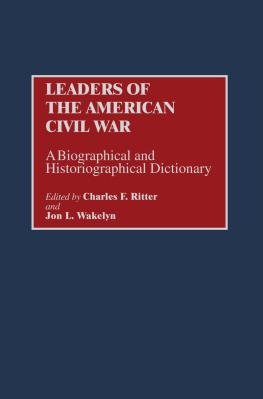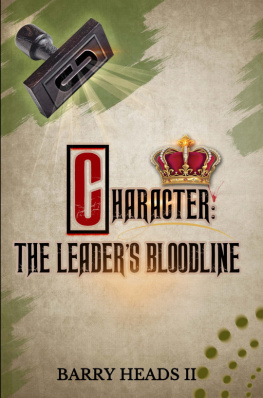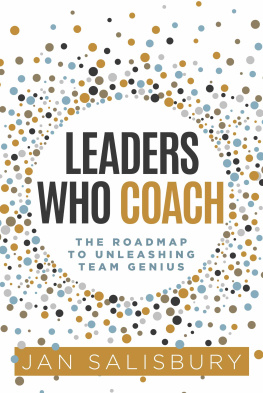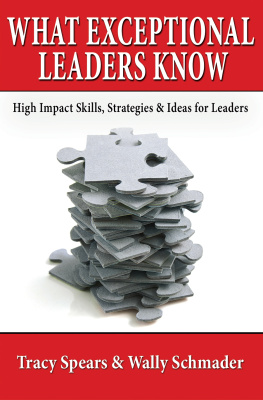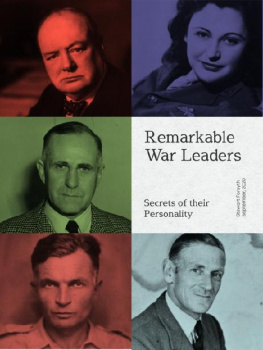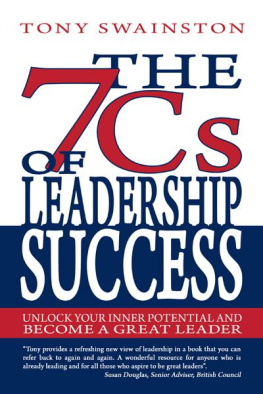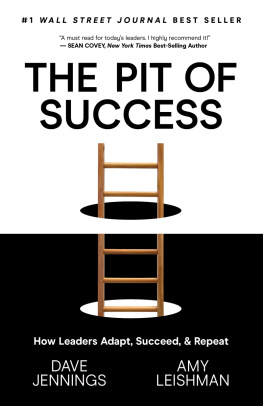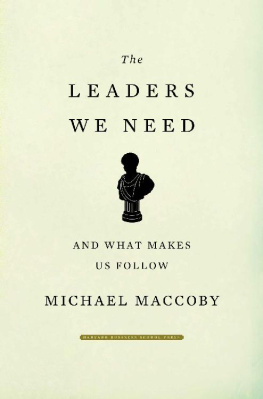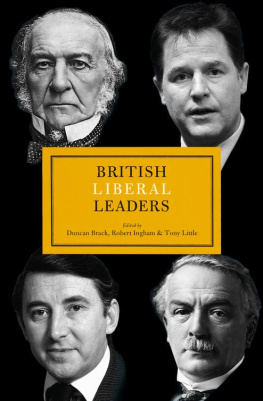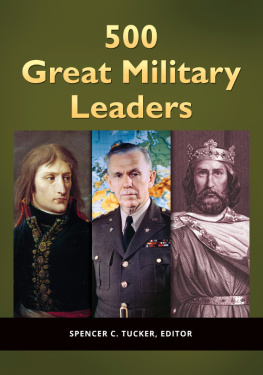First published 1998 by Fitzroy Dearborn Publishers
Published 2013 by Routledge
2 Park Square, Milton Park, Abingdon, Oxon OX14 4RN
711 Third Avenue, New York, NY, 10017, USA
Routledge is an imprint of the Taylor & Francis Group, an informa business
Copyright 1998 by Charles F. Ritter and Jon L. Wakelyn
All rights reserved, including the right of reproduction in whole or in part in any form.
Library of Congress and British Library CIP is available.
ISBN 13: 978-1-579-58112-1 (hbk)
For the leaders included in this volume, the Civil War constituted the major event of their lives. For most of them, their participation in that war was also the major activity and accomplishment of their busy and important careers. They have been selected for inclusion in this dictionary, then, because of their various major contributions to that war. A number of the leaders included in this book have been regarded as some of the most important and greatest leaders in this countrys history. Some, however, have neither received full due for their contributions to the war nor been regarded as great leaders. But each of them, in the many different kinds of service needed in modern warfare, made a major impact on his or her respective sides war effort. All forty-seven, it will be shown, deserve to be called important leaders of the Civil War.
Because the study of warfare continues to evolve, we have become increasingly aware of its complicated nature and the types of activity required for its function. Although the great military officers remain the central focus of leadership in warfare, and make up the major category of those included in this volume, other leaders, too, deserve study. Civilian political leaders Abraham Lincoln and Jefferson Davis, as presidents and commanders in chief of their respective war machines, used their most important government subordinates to make and carry out war policies. Those so-called lesser governmental and political leaders were integral to the wars functioning. Government leaders supported the activities of the military leaders, as they provided food, clothing, and armaments and delivered personnel to the front lines. In the Civil War, the interaction of central and state authorities was crucial to the recruitment of troops and to financing the war. War governors activities thus became important to the success or failure of the war effort. In addition, members of the congressional leadership bridged the gap between state and central policies, and the most important of them dealt with the legislative policies of the central governments. Behind the lines, a number of leaders, often neglected by students of warfare, had major parts in the war effort. Businessmen, bankers, and manufacturers provided the resources of war. Jay Cooke, the Unions major fund-raiser, and Joseph Anderson, the Confederacys most important arms maker, fitted into this category. Perhaps equally important were those civilian leaders who contributed to the morale of each side. Thus, preachers and journalists have come in for critical reappraisal. Finally, women in key positions to counsel and to provide support for other leaders are regarded as important leaders. The most important leaders from each of these categories make up those included in this biographical dictionary.
Those who have been included in this dictionary have had their life stories studied in similar fashion. Their upbringing, family life, education, relation to their age cohort, and prewar experience are discussed as preparation for their participation in the war. Why those leaders would give so much of themselves to the war effort has been a question asked of their upbringing and training. Wartime activities, of course, take up the central place in these entries. The positions they held and the places of their action have been discussed in full. More important, the interaction of those leaders with other leaders has been described and analyzed. A few built upon their war activities to fashion important contributions to the postwar period. Ulysses S. Grant and Andrew Johnson are examples of this group. However, no matter how much these leaders influenced events during the entire war era, their wartime experiences and accomplishments are the central focus of this dictionary. How they fared during the postwar period, what they did to enhance their wartime reputations, and how their war experience continued to influence their lives are discussed in depth. Each entry is cross-referenced, indicating other biographical subjects who also appear as entries.
A secondary, but most important, part of this dictionary discusses how the leaders wanted to be remembered in history and how history has evaluated their accomplishments. The last part of each entry includes an evaluation of how historians have regarded these leaders. Thus, those leaders reputations have been analyzed historiographically. The leaders views of themselves, the support or criticism of postwar memoirists and biographers, and the verdict of early historians are included in the bibliographical section. In addition, the best modern historical studies of their lives have been used to assess their contributions to the war. A chronological bibliography, from the earliest works to the present, concludes each entry. To set this study into historical context, the introduction critiques how students of their lives, from witnesses to their accomplishments to modern historians, have regarded their reputations.
The purpose of this dictionary, then, has been to study the lives of many of the Civil Wars most important leaders by providing the reader with an up-to-date analysis of their activities, the ways they achieved fame, and the reasons why their reputations are what they are today. The late Thomas Lawrence Connelly, a modern historian of the many types of Civil War leaders, profoundly influenced the organization and purpose of this volume. Connelly both evaluated leadership reputation building and analyzed leadership accomplishment. For his contribution to our understanding of the relationship between accomplishments and reputation making, we dedicate this book to Toms memory.
We also have a number of other people to thank for the final shape of this dictionary. Charles Ritter would like to thank the library and staff of Notre Dame College in Maryland, while Jon L. Wakelyn thanks the library staffs at the Catholic University of America and Kent State University for help in finding rare sources. David Kelly of the reference division of the Library of Congress was a major source of goodwill and bibliographical references for both of us. Besides contributing to the volume, Fred Blue, Herman Hattaway, John Hubbell, Leonne Hudson, John Marszalek, Jim Rawley, and Steven Woodworth have given us excellent advice on analyzing the wartime accomplishments of the leaders included in this volume. Those who advised us may not agree with all of our assessments, and certainly they are not to be held accountable for any of our mistakes. Wakelyn wishes, in addition, to thank John Allen, Michael Connolly, Clayton Jewett, and Kenneth Nivison, his graduate students at Catholic University, for the privilege of being their adviser. Frank Vandiver, mentor, friend, and colleague of Tom Connelly and Jon L. Wakelyn, shared with us his expertise on the Civil War. One would think that he would have lost patience or at least interest. Last, but not least, we thank our wivesPam and Joycewho suffered much from hearing about this joint effort.

